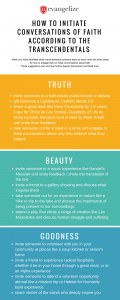When was the last time we cried because of something positive? Here are three examples of being profoundly moved to tears. First, Stephen Ray is a famous Catholic apologist who converted from Evangelical Christianity. He became Catholic only after reading endless books on the early Church, studying the Church Fathers, and answering all of his intellectual objections. The day after he and his wife decided they were going to become Catholic, they went to their first Mass. When Stephen describes the experience of seeing the priest walk down the aisle in the entrance procession, he gets choked up: “I felt like I was in the presence of an apostle.” He and his wife cried during the entire Mass because they felt as if they were taken back 2,000 years, to the Church Jesus founded (Stephen Ray, Finding the Fullness of Faith, 59:53).
Second, has anyone seen the movie Inside Out, an incredible animated film about a young girl’s turmoil when her family moves to a new city? Anyway, I always cry when I see the young girl’s imaginary elephant friend sacrifice himself so that she can be happy. (If you don’t cry when you see that, you need to soften your heart).
Third, when a friend of mine had the first of his five children, he e-mailed everyone saying how he cried during the delivery, because it was so beautiful to see his daughter literally come into the world.
Dear brothers and sisters, and dear guests to our community, what positive things or experiences make us cry? These experiences tell us about how we’re designed, and how God invites us into a relationship with Him.
 Scripture scholars point out that, in today’s Gospel, even though Jesus is on trial, He’s offering Pilate an opportunity to believe (Francis J. Moloney, The Gospel of John in Sacra Pagina, 494)! The text says, “Pilate asked Jesus, ‘Are you the King of the Jews?’ Jesus answered, ‘Do you ask this on your own, or did others tell you about me?’” (Jn 18:33-34). Here “our Lord is asking Pilate to decide between a faith that is based on hearsay (what others have told him about Jesus) and a faith… based on personal encounter… (what he can say about Jesus)” (Daniel Mueggenborg, Come Follow Me, 331).
Scripture scholars point out that, in today’s Gospel, even though Jesus is on trial, He’s offering Pilate an opportunity to believe (Francis J. Moloney, The Gospel of John in Sacra Pagina, 494)! The text says, “Pilate asked Jesus, ‘Are you the King of the Jews?’ Jesus answered, ‘Do you ask this on your own, or did others tell you about me?’” (Jn 18:33-34). Here “our Lord is asking Pilate to decide between a faith that is based on hearsay (what others have told him about Jesus) and a faith… based on personal encounter… (what he can say about Jesus)” (Daniel Mueggenborg, Come Follow Me, 331).
But Pilate distances himself from this personal faith by saying, “I am not a Jew, am I? Your own nation and the chief priests have handed you over to me. What have you done?” (Jn 18:35). It’s interesting: even though Pilate just asked if Jesus was a king, Jesus doesn’t talk about Himself but about the kingdom: “Jesus answered, ‘My kingdom is not from this world. If my kingdom were from this world, my followers would be fighting to keep me from being handed over to the Jews. But as it is, my kingdom is not from here’” (Jn 18:36). Just as He did with Nicodemus earlier in the Gospel (Jn 3:3-5), Jesus is talking about entering the kingdom—He’s still offering Pilate a chance to enter the kingdom.
The last opportunity for Pilate comes when Jesus says, “For this I was born, and for this I came into the world, to testify to the truth. Everyone who belongs to the truth listens to my voice” (Jn 18:37). (See also Thomas L. Brodie, The Gospel According to John, 535). Yet Pilate rejects this offer with his now-famous question, “What is truth?” (Jn 18:38).
In philosophy and theology, we talk about three (what are called) ‘transcendentals,’ that is, truth, goodness, and beauty. God is all of these: He is truth, He is goodness, and He is beauty itself. Whenever we see something that’s true, good, or beautiful, it’s a reflection of God. And in the Gospel scene, Jesus draws Pilate to Himself by all three transcendentals: 1) Jesus is the way, the truth, and the life (Jn 14:6), so “the truth is quite literally staring Pilate in the face” (Francis Martin & William M. Wright IV, The Gospel of John in Catholic Commentary on Sacred Scripture, 306); 2) We see goodness in Jesus’ kingdom: His kingdom is not one of earthly power and fighting, but of peace (Cf. Jn 18:10-11); 3) His response while under trial is beautiful and inspiring (Cf. Acts 6:15). Amazingly His disposition is not one of anger or fear, but of calm confidence, self-possession and strength (Cf. St. John Chrysostom in John 11-21 in Ancient Christian Commentary on Scripture, 289).
The reason why I asked what positive things make us cry is because they can tell us which transcendental speaks to us the most. We’re all unique, and so relate to God in unique ways. Stephen Ray cried because he had spent his whole life looking for truth, and when he went to that Mass, he knew he was in the church Jesus founded. Have you noticed that I typically get choked up when I talk about sacrifice? If I talk about my brother’s fasting for his people, or about that little girl in China who died for the Eucharist, or Batman’s sacrificing himself for Gotham City at the end of Dark Knight Rises, watch out, because tears are coming, let me tell you! And my friend who described his first daughter’s birth as beautiful, conveyed that beauty could be his favoured transcendental.
Jesus is asking us to identify our own unique transcendental, where He often draws us to the Father’s heart. Here are a few questions to help us know: What do we like to do on the weekend? Do we lean towards truth (in lectures, reading), or to goodness (by volunteering, extending hospitality, spending quality time with family), or to beauty (going to museums, listening to music, or enjoying nature)? What kind of books do we read? Academic ones, dramatic classics, or biographies? If we could volunteer for one cause, what would it be? If we could have dinner with anyone living or dead, who would it be? Pay attention to the values behind what we’d choose.

 This will let us know how to renew ourselves spiritually, whether it’s by being in a beautiful church, in God’s creation, immersing ourselves in the details of Sacred Scripture, or meditating on the life of Jesus. All the questions we just asked are in an insert in the bulletin today, and I thank UEvangelize for letting us print them.
This will let us know how to renew ourselves spiritually, whether it’s by being in a beautiful church, in God’s creation, immersing ourselves in the details of Sacred Scripture, or meditating on the life of Jesus. All the questions we just asked are in an insert in the bulletin today, and I thank UEvangelize for letting us print them.
Once we know ours, we need to pay attention to the transcendental leanings of other people. What do our spouse, children or friends truly appreciate? What truly renews them? When we discover it, then we work to make, for example, our home more beautiful and tidy, or we try to give them reasons/explanations for why we do things or think a certain way; or we try to show greater love for them by acts of service, giving a gift, or telling them we love them.
In terms of evangelization, knowing people’s preferential transcendental is part of the way God will lead them. We’re here to proclaim Jesus at every opportunity, because this is the most loving thing to do, and we want to do it in a way they can receive it. If we ever meet someone whose primary leaning is towards truth, then we need to help them with good arguments or by giving them quality videos or books such as Mere Christianity by C.S. Lewis or books by Peter Kreeft. Jack Ong, who will be baptized this Wednesday, said that his primary transcendental is truth. He sees the Church as a moral compass; he says, “Without the hard lines sometimes taken by the Church, society goes off into a very bad plan.” Admittedly, most people don’t come to God primarily by truth, because, in our post-modern culture, many don’t believe in truth and most of us have been taught to think with our feelings. Often when I give people rational arguments for the existence of God, the divinity of Jesus, or why God allows suffering, they still don’t accept these concepts because there’s an emotional or spiritual block.
 So probably the most persuasive transcendental today is goodness. Bishop Barron says that the greatest Catholic evangelist of the 20th century was…? Mother Teresa. By her incredible love of the poor, her self-sacrifice and radical life, she persuaded the whole world that she truly believed in Jesus and that Jesus’ love is real. The famous BBC journalist, Malcolm Muggeridge, came to Jesus through her. Similarly, my dad finally came back to God through the goodness of the people at Alpha. That’s why Alpha and the first level of Faith Studies are so wildly fruitful, because they introduce people to Jesus in a place with good people who will listen and love.
So probably the most persuasive transcendental today is goodness. Bishop Barron says that the greatest Catholic evangelist of the 20th century was…? Mother Teresa. By her incredible love of the poor, her self-sacrifice and radical life, she persuaded the whole world that she truly believed in Jesus and that Jesus’ love is real. The famous BBC journalist, Malcolm Muggeridge, came to Jesus through her. Similarly, my dad finally came back to God through the goodness of the people at Alpha. That’s why Alpha and the first level of Faith Studies are so wildly fruitful, because they introduce people to Jesus in a place with good people who will listen and love.
A doctor of physics wrote: “I am not a Christian because… someone… diagrammed it for me. I am a Christian because I have been loved deeply and unconditionally by Christians. Some of them… troubled me with hard questions. But all of them loved me when I did not love them.”
Bishop Barron, perhaps the greatest American Catholic evangelist today, says we should evangelize by highlighting beauty, because it’s disarming; people need to see the whole picture, how Jesus and Catholicism make life better, before entering into the details of the faith (Cf. Bishop Robert Barron, To Light a Fire on the Earth, 44).
How many have seen the movie Interstellar from 2014? The soundtrack of the movie by the great composer Hans Zimmer uses the organ a lot because the organ “gives a sense of religiosity, of reaching out towards something infinitely greater and infinitely more vast than our lives on earth… That’s what the greatest cathedral organs were designed for.” So, when we Catholics use our greatest artistic treasure, which is our music (Sacrosanctum Concilium, 112), to its full potential, it can touch souls in profound ways. Someone here said to me, “More and more, the readings at Mass make me teary-eyed because I see the beauty of God’s Word in its pure form. Even singing the Glory to God can invoke deep feelings of joy and I can feel myself choking and I cannot sing well anymore.”
While I believe that most people don’t come to God by beauty alone (See this video at 1:35:10), we still need beautiful, clean, and sacred churches to remind people of God, and to set the stage for responding to Him.
As we get closer to Christmas, we need to keep in mind that our focus for these months, hospitality, is designed to win people for God through goodness. But we also need to improve the homilies, the music, and the way we celebrate Mass.
In the end, we need to do all three, as Bishop Barron, whose style is “intelligent yet understandable, compelling yet approachable.” No more dumbed down Catholicism. We need to be smart, bold, confident, and beautiful, as Jesus was.
God created us out of love and for a relationship with Him, and we’ve separated ourselves from Him, but He sent us His Son to bring us home, and we’re invited to respond—that’s the Kerygma, the essential message of Christianity, as we’ve talked about before. Jesus is always trying to win us through transcendentals. What will be our response? I hope we open our hearts, repent, and ask Him to be the centre of our lives.
Let’s finish by showing a two-minute clip from The Passion of the Christ which shows today’s Gospel: Jesus on trial. Remember that Jesus is offering Pilate a chance to enter the kingdom through truth, goodness and beauty.

